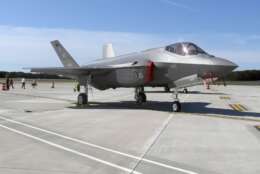Defense News
-
The Army wants industry to help it change the way it structures its data. A newly-released request for information is a key first step in building a federated, decentralized model the Army calls the Unified Data Reference Architecture.
November 11, 2022 -
The Defense Information Systems Agency is evaluating operational assessment, operational tests and the user’s experience as part of whether it should move its zero trust pilot into production.
November 10, 2022 -
In today's Federal Newscast: GAO warns the Coast Guard that it's way behind improving safety aboard older commercial fishing vessels. DoD employees who drive electric vehicles will have an easier time charging their vehicles in 2023. And veteran homelessness dropped 11% in 2022, according to the VA.
November 07, 2022 -
No one knows what the F-35 aircraft can do in a war, say, over Taiwan. One thing we do know is the fifth-generation fighter, now something like 20 years in development, has economic significance. Something like $72 billion F-35 dollars is spread throughout the U.S. economy every year. For more details, the Federal Drive with Tom Temin spoke with Kevin Michaels, the managing director of AeroDymanic Advisory.
November 04, 2022 -
In today's Federal Newscast: Take me to your leader; the Space Force has a new one. A union for federal employees suggests some agencies might be sort of suppressing the vote. And DoD's Zero Trust strategy will soon go public.
November 03, 2022 -
No one particularly likes Defense Department's PPBE process. It’s rigid, inflexible, and very slow. But it's been encoded into the DNA of the Defense bureaucracy for more than 60 years. Over the next year, two separate groups of experts will try to figure out how to fix the system.
November 03, 2022 -
The Army says SBOMs are "going to happen" and is now asking for feedback on how to use them as part of the acquisition process.
October 31, 2022 -
The Defense Department's Cyber Crime Center, known as DC3, has a new executive director, Jude Sunderbruch. He joined the Federal Drive with what's new at the DC3 and what he plans for this crucial office.
October 28, 2022









